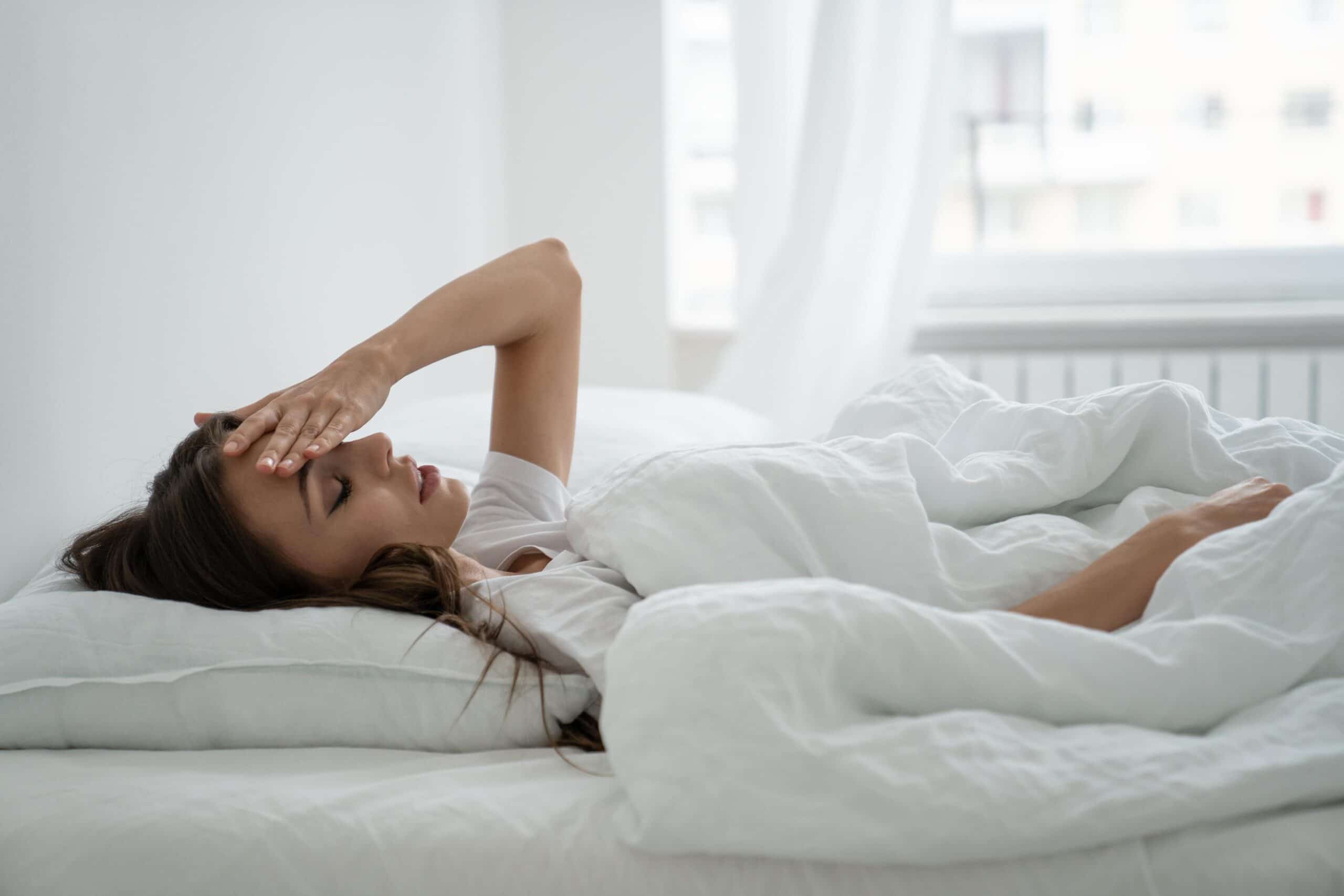What are the symptoms of postpartum night sweats?
Postpartum night sweats refer to excessive sweating that occurs during the night after childbirth. Symptoms typically include:
- Excessive Sweating: Profuse sweating during sleep, which may soak through bedclothes and bedding.
- Feeling Overheated: A sensation of being unusually hot or experiencing hot flashes while sleeping.
- Frequent Night Waking: Waking up frequently during the night due to discomfort from sweating or feeling overheated.
- Chills: After the sweating episodes, you may feel cold or experience chills as the sweat evaporates.
- Unexplained Wetness: Bedding, pillows, and sleepwear may become damp or wet from the sweat.
- Disrupted Sleep: Difficulty staying asleep or experiencing disturbed sleep patterns due to the discomfort from sweating.
- Generalized Sweating: Sweating may occur across the entire body or be localized to specific areas like the back, neck, or face.
Postpartum night sweats are typically caused by hormonal fluctuations, changes in body temperature regulation, and the body’s adjustment to the postpartum period. If night sweats are severe, persistent, or accompanied by other symptoms like fever, pain, or signs of infection, it’s important to consult a healthcare provider to rule out other potential causes and ensure appropriate care.
What are the causes of postpartum night sweats?
Postpartum night sweats can result from various factors related to hormonal changes, physical adjustments, and other postpartum conditions. Common causes include:
- Hormonal Fluctuations: Rapid changes in hormone levels, particularly the decrease in estrogen and progesterone after childbirth, can affect body temperature regulation and lead to night sweats.
- Physical Recovery: The body’s adjustment to postpartum changes, including the return to pre-pregnancy hormone levels and the healing process after childbirth, can contribute to sweating.
- Breastfeeding: The physical demands of breastfeeding and related hormonal changes can influence body temperature and sweating patterns.
- Increased Metabolism: The increased metabolic rate associated with postpartum recovery and breastfeeding can result in higher body temperature and sweating.
- Fluid Shifts: The body redistributes fluids postpartum, which can contribute to sweating as excess fluid is eliminated.
- Stress and Anxiety: Emotional stress and anxiety associated with adjusting to motherhood, managing a newborn, and other life changes can trigger night sweats.
- Infection: Postpartum infections, such as endometritis (infection of the uterine lining), can cause symptoms including fever and night sweats.
- Medications: Certain medications taken postpartum, including those for pain relief, postpartum depression, or other conditions, may have night sweats as a side effect.
- Postpartum Thyroiditis: Inflammation of the thyroid gland that can occur after childbirth may affect body temperature regulation and lead to night sweats.
- Overheating: Wearing heavy or non-breathable sleepwear and using excessive bedding can cause overheating and result in night sweats.
- Preexisting Conditions: Conditions like hyperthyroidism or other metabolic disorders may also contribute to night sweats.
If postpartum night sweats are severe, persistent, or accompanied by other concerning symptoms, it is important to consult a healthcare provider to determine the underlying cause and receive appropriate treatment.
What is the treatment for postpartum night sweats?
Treatment for postpartum night sweats generally focuses on managing symptoms and addressing any underlying causes. Here are common approaches to alleviate postpartum night sweats:
1. Hormonal Management
- Consult a Healthcare Provider: If hormonal fluctuations are causing significant discomfort, discuss potential treatments with a healthcare provider. They may suggest hormonal therapies or other medications if necessary.
2. Cooling Measures
- Adjust Sleep Environment: Use lightweight, breathable bedding and sleepwear made from natural fabrics like cotton. Keep the bedroom cool by adjusting the thermostat or using a fan.
- Cool Compresses: Applying a cool, damp cloth to the forehead or neck can help reduce body temperature and alleviate sweating.
3. Hydration
- Drink Plenty of Water: Staying well-hydrated can help the body regulate temperature and replenish fluids lost through sweating.
4. Stress Management
- Relaxation Techniques: Practice stress-reducing activities such as deep breathing exercises, meditation, or gentle yoga to manage anxiety and stress that may contribute to night sweats.
- Support System: Seek support from family, friends, or support groups to manage the emotional and physical demands of postpartum recovery.
5. Dietary Adjustments
- Balanced Diet: Maintain a balanced diet to support overall health. Avoid spicy foods and caffeine in the evening, as these can sometimes exacerbate sweating.
6. Medical Evaluation
- Review Medications: If medications are suspected to be causing night sweats, discuss alternatives with a healthcare provider.
- Check for Infections: If there is a suspicion of postpartum infections, such as endometritis, prompt medical treatment is necessary.
7. Addressing Underlying Conditions
- Thyroid Health: If thyroid issues are suspected, a healthcare provider may perform tests and suggest appropriate treatment for postpartum thyroiditis or other related conditions.
8. Lifestyle Adjustments
- Regular Exercise: Engage in moderate physical activity to help regulate body temperature and manage overall health.
- Sleep Hygiene: Establish a regular sleep routine and create a comfortable sleep environment to improve sleep quality and reduce the impact of night sweats.
9. Postpartum Support
- Counseling or Therapy: If night sweats are associated with emotional or psychological stress, consider seeking counseling or therapy to address underlying issues.
If night sweats persist or are severe, it’s important to consult with a healthcare provider to ensure that there are no underlying medical conditions contributing to the symptoms.

Leave a Reply
You must be logged in to post a comment.